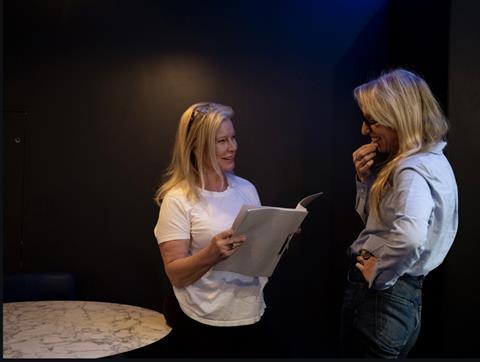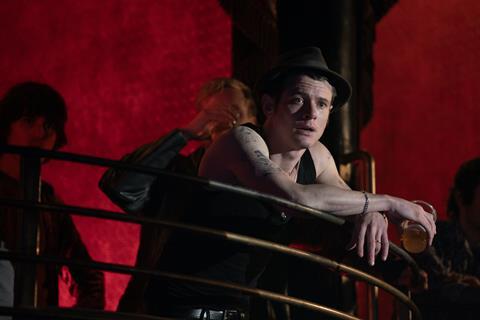
Ahead of this week’s UK-Ireland release of Amy Winehouse biopic Back To Black, Monumental Pictures producer Alison Owen has detailed how she secured the trust of the Winehouse family.
In 2019 Owen met at Monumental’s then-offices in Islington, north London with Amy’s parents Mitch and Janis, and Janis’s partner Richard Collins (who died in 2022). It was Owen’s experiences with her own famous daughter – singer Lily Allen, a contemporary of Winehouse – that got them on-side.
“It’s a bizarre thing having a child who suddenly becomes famous, especially at a young age,” says Owen. “One minute they are arguing with their siblings about who’s got the most roast potatoes; the next they’re number one and there’s paparazzi hanging off the drainpipes. There’s no rule book; you have to make decisions, often with a young person who doesn’t want to hear your thoughts.
“Nobody makes all the right decisions all the time – you just do the best you can at the time,” Owen adds. “Mitch and Janis both felt that I understood the situation. I wasn’t interested in making a film that was judgemental or seeking to apportion blame.”
Life rights are not required in the case of a deceased person, but Owen still wanted the family on-side, sharing the finished script with Mitch and Janis “as a courtesy – that’s their daughter”.
Owen made clear from the beginning that neither Mitch nor Janis would have any approvals. But, despite not seeing them in-person for several years after that initial meeting, she kept them informed by email as the film’s elements came together.
Back To Black opens in the UK and Ireland this Friday, April 12 through Studiocanal. A US release will follow on May 17 through Focus Features.
Origin story
Owen originated the $30m film in 2018 through a desire to reframe the narrative around Winehouse.

“People who die young become overly defined by that death rather than their life,” says Owen. “And it happens to younger women more than it does to men. As a feminist it irritated me that people were obsessed with, ‘Whose fault was it Amy died?’ People don’t ask that question about Jimi Hendrix or Jim Morrison, because they’re adult men taking the consequences of their own decisions.
“Amy was fragile in some ways but she was also strong. She was not a candle in the wind, she was a blowtorch.”
The producer met Winehouse a few times before the singer’s death in 2011 from alcohol poisoning. “I was with Lily at a record launch, and I remember watching Amy and Blake [Fielder-Civil, Winehouse’s long-time romantic partner] dancing together,” says Owen. “She was very thin at that time. It looked so headed for disaster; but so impossible to stop.”
Debra Hayward, Owen’s producing partner at Monumental since 2014, needed little convincing. “We both have to sign off if we’re developing another film, [but] all she’s going to say is, ‘If you want to do it, I’ll support it’, and vice-versa,” says Owen. “We run everything together, we’re a very solid partnership.”
Owen’s choice for director was Sam Taylor-Johnson, whose previous film work includes 2009’s Nowhere Boy about the early life of John Lennon.
“Sam said, ‘I would love to do this, but my only caveat is I don’t want to have any approvals – if you’ve got the music rights clear, I’ll do it.’ She didn’t want to have to buy a book we would then have to tap dance around,” says Owen.
The Winehouse estate had previously sold all Amy’s publishing rights to Universal Music and Sony, to Owen’s advantage: “It’s a lot easier to deal with when it’s just business rather than the family.”
Clearing those rights with the assistance of Universal Music UK CEO David Joseph paved the way to attaching Taylor-Johnson, who in turn brought on her Nowhere Boy writer Matt Greenhalgh.
Shared passion
Owen was about to go out to financiers for development funding when she got a call from Joe Naftalin, senior vice president, production & development at Studiocanal, who had heard she was working on a Winehouse story.
“That’s brave when someone at a studio reaches out because you know someone’s got a shared passion,” says Owen.
Bringing on board Studiocanal so early also allowed the producer to move forward without a US partner, which Owen admits gave her cause for concern.
“[A US partner] would have been more problematic, we’d have had to convince them of everything,” says Owen, whereas “Joe really got the ‘Camden’, the Britishness of it all”.
Studiocanal paid for Greenhalgh to write the script, which he delivered in 2020. From Owen’s perspective, they could have used that initial draft as the shooting script, but further drafts were required given the sensitivities around telling the life story of a beloved, but controversial icon.
“People approach it with trepidation,” says Owen. “With most music biopics, it’s a longer period [after the person’s life] until they come out. People are nervous because there’s been so much talk of exploitation around her.”
Still, the team’s confidence in what they had brought the film together at speed. “Sometimes making a movie, you feel like you’ve got the wind at your back.”
Owen acknowledges the $30m budget is “large for a film without an A-list star”.
“The battle with this movie was convincing the financiers that the music was the star,” says the producer, who feels they “got lucky” in finding UK actress Marisa Abela – a Screen Star of Tomorrow last year – for the lead. “If we hadn’t found someone as brilliant as Marisa, we might as well have packed up and gone home.”
For the role of Fielder-Civil, Taylor-Johnson suggested Jack O’Connell, with whom Owen had worked on 2017 romantic drama Tulip Fever. She says the film was aiming for a measured depiction of Winehouse’s controversial ex-husband, who she was married to for two years between 2007 and 2009.

“The tabloids presented him as a scuzzy junkie but Amy didn’t fall in love with a scuzzy junkie,” says Owen. “Amy thought Blake was James Dean meets Joe Strummer meets Romeo. He was this glamorous, clever, bad boy, sexy thing. And they adored each other.”
The production had considered using Winehouse’s singing voice, and then looked at melding it with Abela’s. After Abela began training her voice following her first audition and before she secured the part, they went with the actress’ singing alone. “She worked so hard,” says Owen. “I feel like Amy was guiding us from above.”
With “a number of bidders in the US market”, Focus Features acquired US rights once casting was complete, and Back To Black shot in locations across London from January to April 2023, with Owen bringing on regular collaborator Nicky Kentish Barnes as a third producer to supervise the budget.
Monumental achievement
Monumental celebrates its 10th anniversary this year. As well as feature films including Suffragette and How To Build A Girl, the company has thrived making TV series such as Hulu’s Harlots, for three seasons from 2017 to 2019; and five series of supernatural comedy Ghosts for BBC Studios.
The company has done more television than film in its first decade “partly because that’s how the landscape was going with streaming,” says Owen. “You get a lot more flexibility now than when there were only three or four decision-makers, which didn’t suit the way I work.”
Monumental operates as two entities: Monumental Television, which has 16 staff and is wholly owned by ITV; and Monumental Pictures, the fully independent film arm which is just Owen, Hayward and their assistants.
“There’s a synergy between the two companies,” says Owen. “Even though ITV are not benefitting financially from the movies we make, they’re happy for us to go and make them because those talent relationships will feed directly into television.”
While recognising the finer details are still to be ironed out, the producer is hopeful that the recent changes to the UK tax credit will see “the pendulum swinging a little bit back” towards the films Monumental Pictures wants to do. “I don’t tend to go for big sci-fi movies; but neither do I like tiny arthouse. Debra and I both like movies in that $10m-50m range.”
The company’s output has tended towards female-centric stories, but Owen “never set out with this mission statement to make films about women” in her career.
“People used to joke when I was running Ruby [Films, Owen’s company prior to Monumental], every single film poster was a woman’s name – Elizabeth, Sylvia, Tamara Drewe, Jane Eyre,” recalls Owen. “When I first came up in this industry, I did feel a real need for [women’s stories]. I’m a huge believer in ‘see it to be it’.”
Owen is reuniting with Studiocanal for a feature adaptation of Wuthering Heights, with a director attached and casting underway. A shoot for either later this year or spring 2025 is pencilled in, with Owen saying the project “is going to be very different” from the multiple previous adaptations of Emily Bronte’s novel.
Another film is in development with Taylor-Johnson, with details under wraps. Owen will shoot Frauds, a six-part series starring and based on an idea from Suranne Jones, in the Canary Islands from January to April next year, while the second series of both The Marlow Murder Club and Sanctuary are scheduled to shoot this year.
Owen still hopes to make a long-gestating feature about the landmark Roe v. Wade 1973 court decision, which paved the way for safe and legal abortions in the US. But the continued divisiveness of the topic in the US has put it on hold.
“I couldn’t get it cast; even when I went to people who I know are publicly pro-abortion, their reps understandably do not want to alienate half of their fanbase,” says Owen of the project, which she describes as “the Erin Brockovich of abortions”.
Discussions with cast are underway for an adaptation of Zadie Smith’s novel On Beauty, also long in the works; while K-pop comedy Girl Group with Rebel Wilson is still on the slate “when Rebel has some time”; as is Monk, a biopic of jazz pianist Thelonious Monk.
A TV series based on Jackie Collins’ Santangelo mob novels is in development but options have expired on adaptations of Jojo Moyes’ The Giver Of Stars and Jo Baker’s Longbourn.
“Producing is really just making hundreds of decisions all the time,” says Owen. “One’s ability to make those decisions quickly and efficiently is hugely enhanced if you believe in and understand the subject.
“I wanted to make a film about Amy, and – it may be overconfident of me – but I feel like I’m the best producer to be doing that. I know what the vision is, I understand Sam, and I can make those decisions all day.”

























No comments yet